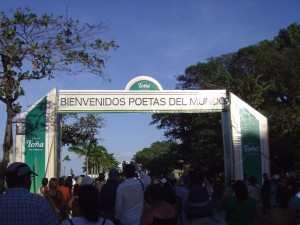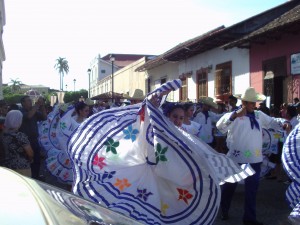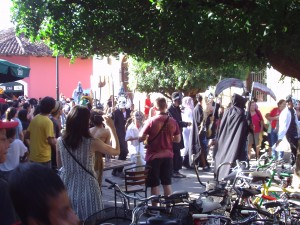The Republic of Poetry
NEW YORK CITY — “Poeta!” It was a term I and other poets from more than 50 countries would hear frequently, during the weeklong Eleventh Annual International Festival of Poetry held in the enchanting Spanish-colonial-era city of Granada, Nicaragua. And it wasn’t uttered derisively, as can be the case in blasé New York, where though much lip service is paid to this craft, and often sullen art, it’s the prose writers who really rule the roost.
One need only peruse regularly the book review sections of The New Yorker and The New York Times to immediately realize this. While the former does publish on the average two poems in each issue, the choices indicate a mistaken belief that the base metal of prose chopped into lines is somehow transformed into poetic gold. At any rate, critical attention paid to new releases in these two venerable mass publications is almost as rare as experiencing a balmy day in February. It has to do with that all-powerful deity, the market. Poets and poetry don’t sell, period.
But before this rant goes any further, let me return to Granada, where the weather was warm, even hot—how I enjoyed the caress of tropical heat on sun-starved skin!—and not only because of a sol whose presence was gladly welcomed by those of us visiting from colder climes, but also due to the outpouring of cariño and camaraderie and even more astoundingly the rapt attention the sizeable audiences of Granadinos and other Nicaraguanenses paid at every reading at the main square, the Plaza de la Independencia. Even when the language read wasn’t Spanish, they were attentive, and waited for the translation that followed. I have never read to a larger gathering than at that plaza, and perhaps never will again.
The 17th-century Spanish poet Francisco de Quevedo once remarked that if poets could fly we would not see the sky, humorously referring to the numerous specimens around during his day. And this was certainly true in Granada. More poets than you could shake a stick at, and from practically every corner of the planet: from Australia and India to Lebanon and Estonia, from Cuba and Haiti to tiny Malta and Sweden, from Mexico and Peru to England and Chile, etc. The quality of the English-language works ranged from the marvelously lyrical to thin, meaning-heavy work. Of course, there is no arguing about taste and in a gathering intended to be universal and democratic, the range of styles was to be expected.
Each edition of the festival is dedicated to a Nicaraguan poet. This time, it was Enrique Fernández Morales, with homage also paid to the memory of the Costa Rican poet Eunice Odio. Presided over by the poet Francisco de Asís Fernandez and assisted by Gloria Gabuardi, also a poet, the festival lived up to its delicious promise. This was particularly true with the Carnival, a kind of Mardi Gras—in fact, it took place on Ash Wednesday—with musicians and dancers parading on the streets, along with all the poets, proceeding until Lago Cocibolca, the scenic lake (the largest in Central America) on whose shores Granada is located. At designated street corners, the parade would stop, and preselected poets would get on a mini-platform erected at the back of a truck, and read one poem each to the crowd. From time to time, the energetic emcees would proclaim a hearty “Viva La Poesia!” It might have been a carnival barker’s ploy to fire up the crowds, but it was music to my ears. You’d never hear this in Nueva York!
Article continues after this advertisementThe route took us past open-air restaurants, cafes, and handicraft stalls, as well as a couple of churches. At one point, having been one of the readers at the first stop, I plopped myself onto a chair at one of the restaurants on the shady side of the street, and watched the revelers and listened to my fellow poets as I quaffed a refreshingly cold beer. Nothing like an ice-cold cerveza on a hot day to heighten one’s enjoyment of poetic revelry. The parade ended at the lake’s edge and there, we were invited to seat ourselves at a grandstand, as the different ensembles of dancers and musicians, from outlying towns, performed in our honor.
Article continues after this advertisementLago Cocibolca is lovely, and one day the festival organizers took all of us out to an islet resort for a picnic. A volcano loomed not too far away, egrets and storks fished, and hawks patrolled the clear skies. Alas, such natural beauty could be history, along with the surrounding towns and farmlands, and most importantly, the vibrant centuries-old culture, if a proposal to build a canal a lá Panama goes through. The environmental impact would be horrendous, and this was the inadvertent subject at an assembly where most of the poets had gathered to be introduced to everyone else. The overwhelming sentiment was clearly against the canal, not just in the assembly, but also in my informal talks with ciudadanos, one of them being the grandson of Augusto Sandino, a restaurant owner and a Granadino to boot. He was decidedly set against the project and declared that while he was a proud Sandino, he most certainly was not a Sandinista—a dig at the Sandinista Danilo Ortega, now Nicaragua’s president and widely thought to be backing, and profiting immensely from, the project.
Ernesto Cardenal was clearly against it. A Granadino, the legendary priest and advocate of Liberation Theology, former Sandinista and Minister of Culture when the Sandinistas deposed the Somoza regime, he read works at the Plaza Independencia that evoked his childhood joys centered around the lake. No direct opposition to the canal but the message was unmistakable. To see and hear one of the living stalwarts, now ninety years old, of Latin American poetry was certainly another highlight of the festival. Cardenal is part of a tradition in Latin America, where poets often play an important role in public life, Pablo Neruda of Chile, Ruben Dario of Nicaragua, and Octavio Paz of Mexico being other prime examples.
Nicaragua has had a stormy and unequal relationship with its giant neighbor to the north that treated it and the rest of Latin America as its “backyard,” the infamous term shamelessly used to encapsulate United States’ imperialist designs during most of the last century. If poetry can be said to have provided a line of defense against such arrogant and overreaching ambition, it would be in Nicaragua. It might be true that poets are the unacknowledged legislators of the world, but here they are very much a force in people’s lives. Plato would have hated this sort of republic, but I for one would have told the Greek, brilliant as he was, to stuff it.
Copyright L.H. Francia 2015


